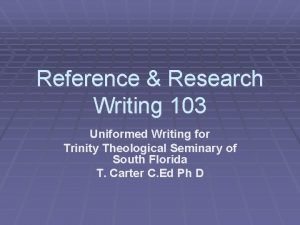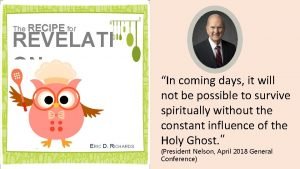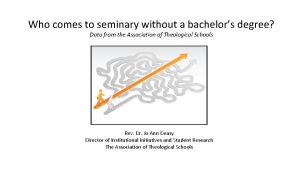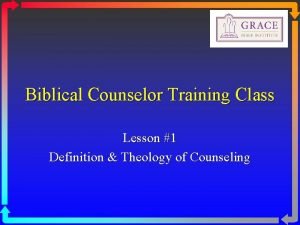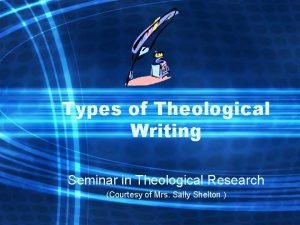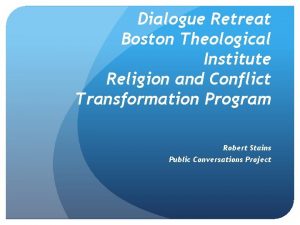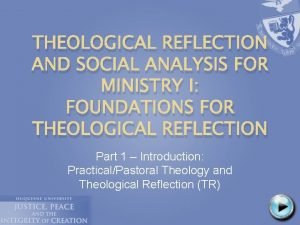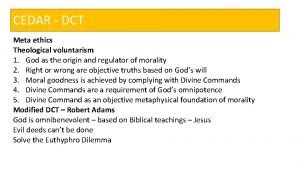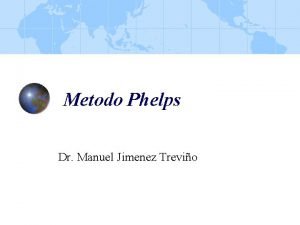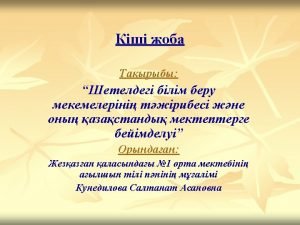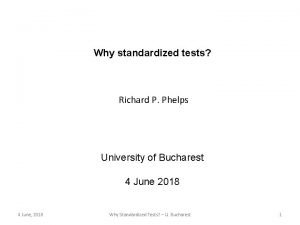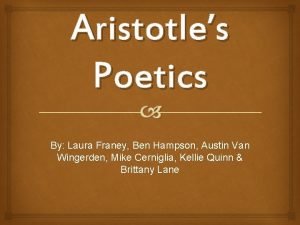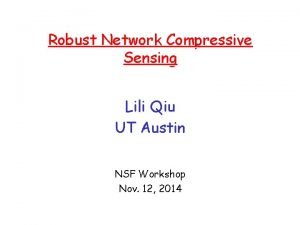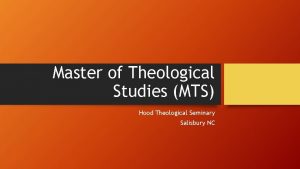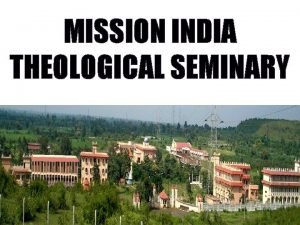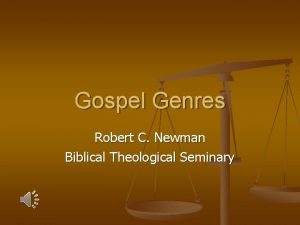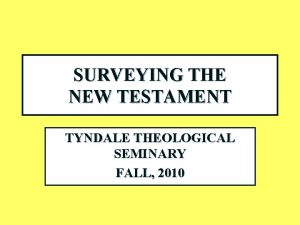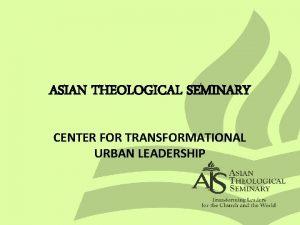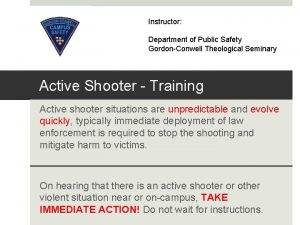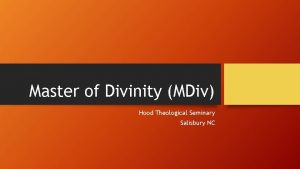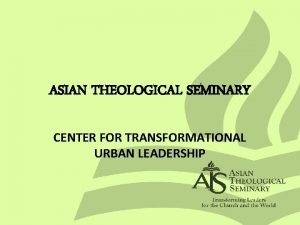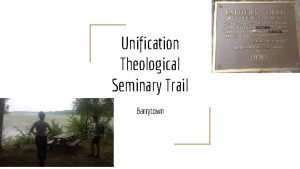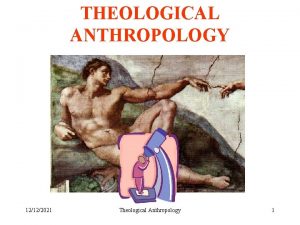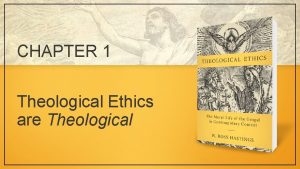Austin Phelps 18201890 President Andover Theological Seminary 18691879




































- Slides: 36


Austin Phelps (18201890) President, Andover Theological Seminary (18691879)








Oh, that I knew where I might find Him! --Job 23: 3

If God had not said, “Blessed are those that hunger, ” I know not what could keep weak Christians from sinking in despair. --Joseph Hall (1574 -1656)

A consciousness of the absence of God is one of the standing incidents of the religious life.

Are there not many “closet hours, ” in which the chief feeling is an oppressed consciousness of the absence of reality from his own exercises. He has no words which are, as George Herbert says, “heart deep. ”

“Never any more wonder, ” says an old writer, “that men pray so seldom. For there are very few that feel the relish, and are enticed with the deliciousness, and refreshed with the comforts, and acquainted with the secrets, of a holy prayer. ”

1)Absence of piety 2)Offering prayers which we are not willing to have answered 3)Not cultivating the temperament of prayer

1) Absence of piety An impenitent sinner never prays. . . finds no such thing in his heart. . . If he drives himself into it for a time, by forcing upon his soul the forms of devotion, he cannot stay there. He is like one gasping in a vacuum.

1) Absence of piety Such a soul does not enjoy God.

1) Absence of piety 2) Offering prayers which we are not willing to have answered

Many of the objects of prayer enchant us only in the distance. Brought near to us, and in concrete forms, and made to grow lifelike with our conceptions, they very sensibly abate the pulse of our longing to possess them. . .

. . . because we cannot but discover that , to realize them in our lives, certain other darling objects must be sacrificed, which we are not willing to part with.

The paradox is true to the life, that a man may even fear an answer to his prayers.

Perhaps that single sin has woven itself like a web over large spaces of our life. It may have run like a shuttle to and fro in the texture of some plan of life, on which our conscience has never glared fiercely as upon a crime, because the usage of the world has blindfolded conscience by the respectability of such a sin.

Yet it has been all the while tightening its folds around us, repressing our liberty in prayer, stopping the life-blood and stiffening the fiber of our moral being, till we are like kneeling corpses in worship.

1) Absence of piety 2) Offering prayers which we are not willing to have answered 3) Not cultivating the temperament of prayer

Prayer is an expression of feeling. We have not sufficiently cherished our Christian sensibilities. We have not cultivated habits of religious desire. . . We have not so trained our hearts that a certain emotive current is always. . . welling up from the depths of the soul, like the springs of the deepest sea. . .

Prayer is an expression of feeling. We have not sufficiently cherished our Christian sensibilities. We have not cultivated habits of religious desire. . . We have not so trained our hearts that a certain emotive current is always. . . welling up from the depths of the soul, like the springs of the deepest sea. . .

We need a culture of sensibility which shall demand these Psalms as a medium of utterance.

Robert Burns lamented that he could not pour out his soul without reserve to any human being, without danger of one day repenting his confidence.


. . . as a substitute for a confidential friend. . . Which he could record himself in, without peril of having his confidence betrayed.


1) Absence of piety 2) Offering prayers which we are not willing to have answered 3) Not cultivating the temperament of prayer 4) Neglecting fragmentary prayer

Prayer. . . Is, in the highest conception of it, a state rather than an act. A full fruition of its benefits depends on a continuity of its influences.

1) Absence of piety 2) Offering prayers which we are not willing to have answered 3) Not cultivating the temperament of prayer 4) Neglecting fragmentary prayer

If God had not said, “Blessed are those that hunger, ” I know not what could keep weak Christians from sinking in despair. --Joseph Hall (1574 -1656)

 President of dallas theological seminary
President of dallas theological seminary Trinity theological seminary of south florida
Trinity theological seminary of south florida Trinity theological seminary of south florida
Trinity theological seminary of south florida Andover landfill
Andover landfill Bellarmine
Bellarmine Ducks unlimited president
Ducks unlimited president Eric richards seminary
Eric richards seminary Bangkok bible seminary
Bangkok bible seminary Himalayan graduate school of theology
Himalayan graduate school of theology Seminary without bachelors
Seminary without bachelors Ofakim seminary
Ofakim seminary Lds lcr login
Lds lcr login Mls lds
Mls lds Mints international seminary
Mints international seminary Theological pyramid
Theological pyramid Human virtues
Human virtues Types of theological research methods
Types of theological research methods Boston theological institute
Boston theological institute Theological reflection questions
Theological reflection questions Act ii the crucible
Act ii the crucible Meta ethics vs normative ethics
Meta ethics vs normative ethics Phelps
Phelps Michael phelps marfan
Michael phelps marfan Joseph schooling michael phelps
Joseph schooling michael phelps Metodo phelps
Metodo phelps Michael phelps
Michael phelps Michael phelps motivational video
Michael phelps motivational video Jenny phelps
Jenny phelps Michael phelps genetics
Michael phelps genetics Phelps test
Phelps test Austin van wingerden
Austin van wingerden Lili qiu ut austin
Lili qiu ut austin Austin energy transfer service
Austin energy transfer service Testamento de freddie mercury
Testamento de freddie mercury Constatativos
Constatativos Market segmentation austin
Market segmentation austin Biography of britney spears
Biography of britney spears


